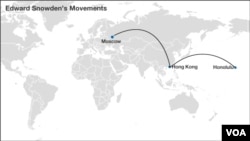Ecuador says it could be several months before it decides whether to grant asylum to a former U.S. intelligence contractor accused by American authorities of espionage for leaking details of clandestine surveillance programs.
Foreign Minister Ricardo Patino on Wednesday compared the case of Edward Snowden, the U.S. fugitive now encamped in the transit zone of a Moscow airport, to that of Julian Assange, co-founder of the secret-disclosing WikiLeaks group whom Ecuador is already harboring in its London embassy.
At a news conference in Malaysia, Patino said it took the Andean nation two months to decide to grant Assange asylum and to not expect it to act any faster on Snowden's asylum bid. He said the country would consider a variety of factors, including whether granting Snowden asylum would hurt trade with the United States, which is seeking Snowden's extradition.
"When we make a decision, we will consider all these risks," he said.
Snowden spent a fourth day out of public sight Wednesday at the Moscow airport, as U.S. officials continued to pressure Russia to extradite him.
Russian President Vladimir Putin on Tuesday confirmed that Snowden is in the transit zone of Sheremetyevo Airport, but said he had no intention of handing him over to Washington, adding that Russia does not have an extradition agreement with the United States.
Snowden is wanted by the United States for revealing a pair of top secret U.S. surveillance programs and other confidential intelligence, but Putin says he has not broken any laws in Russia. He said Snowden is a free man and the sooner he chooses a final destination the better.
He also said Snowden has never worked with Russian security agencies and that he hopes the affair will not affect relations with Washington.
Secretary of State John Kerry said the United States is not looking for a confrontation and called for "calm and reasonableness" in the Snowden situation.
Snowden flew Sunday to Moscow from Hong Kong, where he had been in hiding. His travel plans are unknown after he failed to show up for a flight he was expected to take from Moscow to Havana, reportedly on his way to seek asylum in Ecuador.
Foreign Minister Ricardo Patino on Wednesday compared the case of Edward Snowden, the U.S. fugitive now encamped in the transit zone of a Moscow airport, to that of Julian Assange, co-founder of the secret-disclosing WikiLeaks group whom Ecuador is already harboring in its London embassy.
At a news conference in Malaysia, Patino said it took the Andean nation two months to decide to grant Assange asylum and to not expect it to act any faster on Snowden's asylum bid. He said the country would consider a variety of factors, including whether granting Snowden asylum would hurt trade with the United States, which is seeking Snowden's extradition.
"When we make a decision, we will consider all these risks," he said.
Snowden spent a fourth day out of public sight Wednesday at the Moscow airport, as U.S. officials continued to pressure Russia to extradite him.
Russian President Vladimir Putin on Tuesday confirmed that Snowden is in the transit zone of Sheremetyevo Airport, but said he had no intention of handing him over to Washington, adding that Russia does not have an extradition agreement with the United States.
Snowden is wanted by the United States for revealing a pair of top secret U.S. surveillance programs and other confidential intelligence, but Putin says he has not broken any laws in Russia. He said Snowden is a free man and the sooner he chooses a final destination the better.
He also said Snowden has never worked with Russian security agencies and that he hopes the affair will not affect relations with Washington.
Secretary of State John Kerry said the United States is not looking for a confrontation and called for "calm and reasonableness" in the Snowden situation.
Snowden flew Sunday to Moscow from Hong Kong, where he had been in hiding. His travel plans are unknown after he failed to show up for a flight he was expected to take from Moscow to Havana, reportedly on his way to seek asylum in Ecuador.






